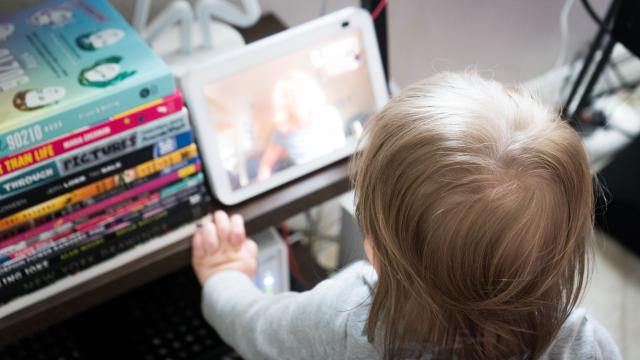Amazon is in every part of our lives. Many of us use its Echo speakers and its Ring security cameras. It’s our online shopping destination for stocking on household essentials we need, like, yesterday. In many ways, Amazon can be considered a utility for families. But considering the mass of products that Amazon makes specifically tailored for kids, how do you protect your child from becoming a customer by proxy?
This is something I’m always thinking about in general, but now more specifically given that Bloomberg reports that Amazon was considering launching another entry into its lineup for kids: an Alexa-powered smartwatch. Amazon, which currently makes a fitness band for adults called Halo, apparently came up with the smartwatch idea after Apple rolled out its Family Setup feature for the Apple Watch. Family Setup allows parents to add set up and manage an Apple Watch for their kids.
According to Bloomberg:
Codenamed Seeker, the GPS-equipped device would be geared toward kids aged 4 to 12 and could take the form of a wristband, keychain or clip, according to documents reviewed by Bloomberg. The voice-activated wearable would provide access to Amazon’s children-focused content and let parents communicate with and monitor their kids.
Amazon planned to sell the Seeker wearable for about $135 and offer wireless connectivity plus a year’s subscription to the rebranded Amazon Kids+. It’s $4 a month for kid-friendly books, movies, TV shows, apps, and games on any of Amazon’s devices, including the Echo Show smart displays.
According to the documents obtained, Amazon was developing additional Alexa-enabled products for kids, including an Alexa-powered karaoke microphone called Jackson. There’s also a wearable device being developed in part with Disney called the Magic Band. It should arrive later this year, though it’s unclear if there’s any affiliation with the current MagicBand wristbands worn by Disney park and hotel guests.
Amazon’s Alexa-powered devices haven’t had the best track record with kids, to put it mildly. In 2019, privacy and child advocates filed a complaint urging the FTC to investigate whether Amazon’s Echo Dot smart speakers were compliant with the Children’s Online Privacy Protection Act (COPPA).
At present, there are a few methods for parents to manage their children’s interactions with the digital assistant: manually delete every recording from the Alexa dashboard, set it up to periodically delete recordings, or remember to shout out to Alexa to scrub the last interaction. Imagine having to do that for every single command uttered by your kid to a theoretical Alexa-powered smartwatch while they’re out of the home.
As a new parent, I’ve had to navigate all sorts of predicaments in my gadget life that I didn’t have to consider before. How connected do I want my child to be? How many screens do I want her to tap on before she’s even able to read? It’s a difficult balance between wanting to give her access to what she needs to succeed in a technology-first world and protecting her from being consumed by it.
That’s not to say I don’t appreciate the kid-centered devices and app offerings.
I gave in to my own surveillance of my toddler because I’m desperate to know she’s alright at all times, but that was after careful consideration for the product. Reports that Amazon is developing kid-centric products add credence to the idea that my daughter is merely a potential customer when technology companies consider developing these sorts of devices.
It’s not just Amazon planning ways to bring the rest of the family into the fold. Facebook, Google, and Apple have their own products, too. This is why it’s time to consider whether technology companies should be selling directly to our children at all. The original U.S. COPPA act was written in 1998, before the onslaught of artificial intelligence and the ability for companies to extract meaning from the intonation in a person — a child’s! — voice.
That’s how Amazon trained Alexa to read along with a book. Until there are more protections to keep these seemingly harmless gadgets from siphoning money-making data from kids, parents and guardians are the only ones who can do the protecting.
